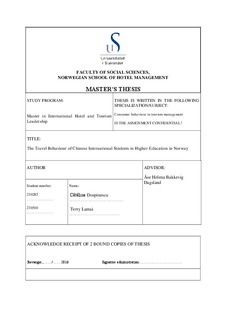| dc.description.abstract | Understanding tourist behaviour is one of the fundamental aspects of tourism industry and business operators. For tourism organisations, “such types of knowledge will provide tourism organisations with invaluable market intelligence which can be reflected in the organisation’s marketing strategy” (Cohen et al., 2014, p. 898). Within tourism consumer behaviour research, many segments remain largely under-researched (Cohen et al., 2014). One of these segments is international students.
The number of international students in Norway has tripled in the recent years. Many are attracted by Norway as a country of study due to its free education system as well as its image as a modern and safe country with great nature. An increasing number of studies on internationals’ students travel behaviour have certainly provided additional knowledge about such segment. However, there are currently no known studies on international students and their travel behaviour in Norway. This study is the first known study focusing on the travel behaviour of international students in Norway. Specifically, Chinese international students were chosen for this study due to the growing and increasing market of Chinese tourists in Norway. Therefore, understanding their travel behaviour is important in order to provide tourism products and attractions, which can satisfy their needs. Additionally, it can also be argued that studies of Chinese international students are able to provide insights into the needs and preferences of the emerging conventional Chinese tourist market (Hughes, Wang, & Shu, 2015), even though they are considered as two markets.
The overall aim of this research is “to explore the travel behaviour of Chinese international students in Norway as means to understand their needs and travel related preferences”. A qualitative methodology approach was employed and semi-structured interviews served as the main the research instrument. The participants of this study were Chinese international students enrolled in higher education institutions in Norway. Data analysis was conducted on the basis of a thematic analysis of transcribed interviews.
The findings indicate that while Norway was not chosen as a study country in the first place, the respondents were all amazed and fascinated by the Norwegian nature and environment. They only travelled to the more popular places due to time and budget contradicts, which is consistent with previous findings. Lack of time is also due to voluntary paid-employment in addition to academic commitment. However, lack of companionship was not considered as a barrier as a majority of respondents preferred to either travel alone or in very small groups. This contradicts with previous literatures. There are further contractions with the previous findings, as they preferred to travel by plane rather than private cars and trains as well as preferring cheap and budget accommodation rather than hotels.
Another important task of this study was to identify the willingness of the Chinese international students market to the recommend Norway to family and friends to visit Norway as a holiday destination. While they would recommend Norway as a holiday destination, they were more reluctant to recommend Norway as a study destination. The reason for such is due to the educational system, which is beyond the scope of this thesis.
The respondents participated did not experience significant travel barriers in general. Nevertheless, a most important finding and contradiction with previous literature is that it was assumed that Chinese international students mostly prefer sightseeing when travelling in the study country. This study revealed that whilst a majority of respondents did state sightseeing as the most popular activity, the reason is that they do not know how to undertake adventure and nature tourism activities nor were they aware of where to find information about such activities. There were thus no lack of interests in adventure and nature-based tourism activities, but travel barriers consist of lack of information and lack of equipment as well as the perception of risk due to lack of perceived skills prevented them to undertake such activities.
For tourism operators that wish to target such segment, the findings provide great knowledge for operators to develop products and services to cater to the needs and preferences of this segment. The knowledge acquired about the travel behaviour of Chinese international students can also be beneficial to understand the conventional Chinese tourist segment in Norway. More detailed and comprehensive studies, which use the longitudinal approaches, may be beneficial to contribute further to the body of knowledge. | nb_NO |

